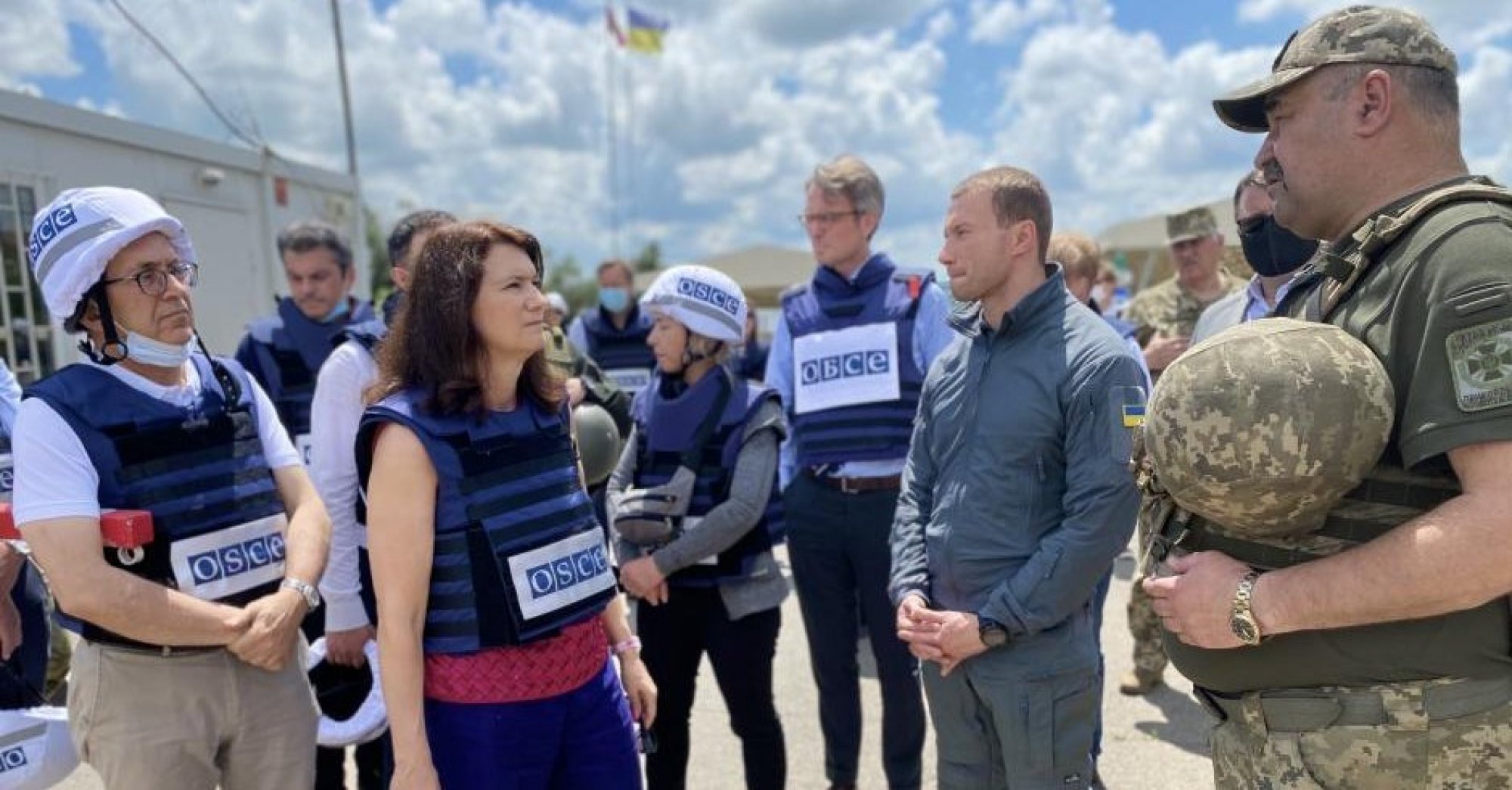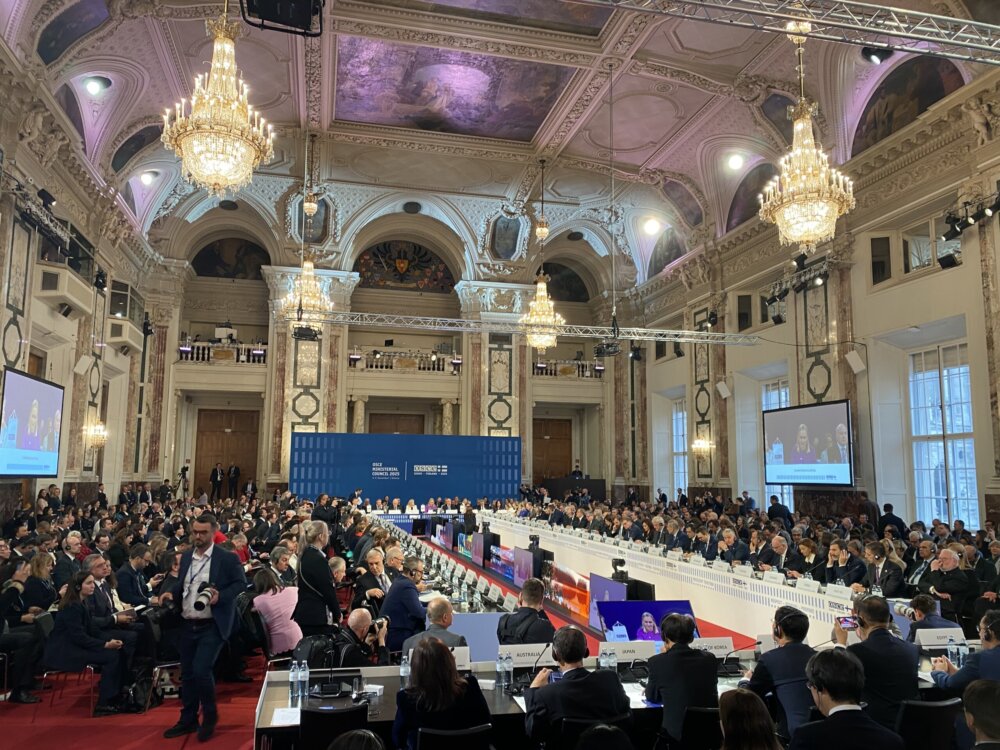OSCE/Evgeniy Maloletka

Sweden’s OSCE Chairpersonship: ‘Tactical mistakes’ amid tense geopolitical situation and ongoing pandemic
During her inaugural speech delivered at the OSCE Permanent Council in January 2021, OSCE Chairperson-in-Office, Swedish Foreign Minister Ann Linde emphasized that the OSCE is “only as effective as we, the participating States, allow it to be”. She added that “too often, important decisions are blocked by the opposition of a few”.
Throughout the year, Sweden has faced gridlock in the OSCE decision-making process, leading to a significant delay in the adoption of the annual OSCE budget, the cancelation of the landmark Human Dimension Implementation Meeting and the postponement of the Annual Security Review Conference (ASRC).
As a result, the Swedish Chairpersonship was in near constant crisis mode. Instead of concentrating on substantive issues, Sweden had to focus on calling meetings to try and forge agreement on procedural issues such as conference agendas.
It also meant that the OSCE had to practically cancel its traditional summer recess in August as negotiations on the annual budget as well as on the agenda of the Human Dimension Implementation meeting dragged on.
The cancelation of the Human Dimension Implementation Meeting, which usually brings together up to 1,500 participants to assess and discuss the human rights situation in the 57 OSCE participating states, was a major blow to the OSCE’s work in the human dimension – particularly during the year that the OSCE Office for Democratic Institutions and Human Rights celebrated its 30th anniversary.
A smaller Human Dimension Seminar was held nevertheless for the first time in four years as well as an event in Warsaw in October to celebrate the 30th anniversary of ODIHR.
Much of this deadlock has to do with the tense global political situation, the current focus on great power competition and the increasing skepticism towards multilateral solutions, also by some Western states. All of this creates problems for the OSCE’s consensus-based decision-making process.
Simmering conflicts in the OSCE region
Several conflicts in the OSCE area remain unresolved or have deteriorated over the course of the past year.
First, the Ukraine conflict is in its seventh year and the implementation of the Minsk Agreements is deadlocked. In addition, military tensions between Russia and the West have reached a new highpoint. Russia is massing troops along the border with Ukraine, adding to fears that Moscow is planning a large-scale military invasion of Ukraine.
Moscow has put forward a list of demands that the West must meet in order to defuse tensions. Among them is a legal guarantee that NATO will not expand further into the East. Russia has also threatened to deploy intermediate nuclear missiles in Europe.
The work of the OSCE Special Monitoring Mission in Ukraine has been severely hampered in the past few weeks with multiple reports of OSCE monitors being denied passage across the contact line, both into government and non-government controlled areas. This makes it increasingly difficult for the OSCE mission to carry out its tasks as assigned in the mandate.
The conflict between Armenia and Azerbaijan over Nagorno Karabakh is negatively influencing almost all debates or negotiations in the OSCE. Armenia and Azerbaijan are both linking their conflict-related grievances to sometimes unrelated issues in OSCE negotiations, blocking important decisions—such as the OSCE annual budget or the agenda of the ASRC—from being adopted swiftly. This negatively affects the OSCE’s efficiency.
In Belarus, the Swedish Chairpersonship was not able to establish a mediation role for the OSCE in the ongoing crisis in the country that was triggered by the disputed 2020 election that the OSCE Moscow Mechanism report found to be “rigged”. Additional attempts by groups of OSCE participating states to convince Belarus to engage constructively via the Moscow and Vienna Mechanisms also failed.
Throughout the year, the COVID-19 pandemic continued to limit effective diplomatic engagement. Negotiations in the run-up to the Stockholm OSCE Ministerial Council meeting were mostly held virtually as social distancing measures limited the possibility for personal interaction.
Tactical mistakes
Overall, Sweden was constrained by the general political environment, but also made “tactical mistakes”, one senior western OSCE diplomat told SHR Monitor. “Sweden worked very hard throughout the year and when things went wrong it was very often not their fault.”
But the diplomat also added that Sweden at times failed to put a high enough political price on the obstructionist behavior of a few states—such as Armenia and Azerbaijan. The diplomat believed that Sweden could have exerted more political pressure in the background to convince both states to refrain from blocking OSCE decisions.
Several OSCE diplomats also told SHR Monitor that Sweden over-emphasized its own foreign policy goals, pushing for gender equality and language on women’s rights to be added to almost every draft ministerial decision, while being fully aware that this would be met by immediate opposition of countries such as Russia or the Holy See.
“I believe that in some contexts it is absolutely essential to add the important issues of women’s rights and gender equality, but in other contexts this is not the case,” the senior western OSCE diplomat said. “You make yourself very vulnerable to criticism and ultimately this leads to lack of consensus on important documents.”
For example, Sweden hoped to adopt a decision at the Stockholm OSCE Ministerial Council meeting on women’s economic empowerment. The draft decision was a substantive document that highlighted the important and evident link between women’s rights and security. But Sweden equally pushed for gender equality in other draft ministerial decisions where the connection was less obvious, leading to their failure, diplomats say.
Ministerial Council adopts only two substantive decisions
In addition, due to the pandemic as well as for reasons of cost-efficiency, the Swedish Chair decided to limit physical participation at the Ministerial Council (MC) meeting in Stockholm.
The MC meeting takes place on an annual basis in the country holding the Chairpersonship. It marks the endpoint of the 12-months presidency and is mandated to adopt decisions that will determine the OSCE’s work in the coming years.
The Swedish Chair allowed only six delegation members to accompany the respective minister to Stockholm. Despite this restriction in attendance, all in all around 1,000 delegates attended the MC meeting. This resulted in apparent COVID-19 cases following the meeting, as announced by the Swedish Chair on 5 December.
Sweden also took the controversial decision to finalize the virtual negotiations on the ministerial decisions by Tuesday evening in Vienna, allowing for travel on Wednesday and the actual ministerial meeting taking place on Thursday and Friday (2 and 3 December).
While some diplomats say that this greatly lowered the stress level, others believe that it created a disconnection between ministerial decisions and the ministers themselves, who were not involved in the negotiation process.
During previous MC meetings, negotiations would often drag on throughout the night and in parallel to the actual plenary ministerial meeting, with some ministers offering their final touches and sometimes helping to create breakthroughs on difficult topics.
As already reported by SHR Monitor on 2 December, the foreign ministers of the 57 OSCE participating states adopted only two substantive ministerial decisions (and three procedural decisions) out of approximately 25 drafts submitted for negotiation.
“Let me be very open and honest,” Swedish Foreign Minister Linde told reporters at a press conference following the Stockholm MC. “I personally would have liked to have seen more decisions and declarations today, for example regarding women’s economic empowerment, which has been a priority area for us during this year.”
Ann Linde said that “strong commitments here would have been important to better equip the OSCE for the future”, adding that Sweden was “still proud” that this topic received much attention during the year. “I am certain that this will continue to be an important area of work in the years to come.”
The first decision adopted by the MC was on strengthening cooperation to address the challenges caused by climate change. This is a new topic for the OSCE and provides a good basis from which the OSCE Office of the Coordinator of OSCE Economic and Environmental Activities will be able to begin assisting OSCE states to increase cooperation to mitigate climate change challenges.
The OSCE MC also adopted a ministerial statement on the negotiations on the Transdniestrian settlement process in the 5+2 format. Talks in this format include Moldova and Transdniestria, as well as the five mediators and observers (OSCE, Russian Federation, Ukraine, the United States, and the European Union).
They have been engaged in finding a comprehensive settlement to the conflict since 2005. This year’s ministerial statement re-affirmed the basic principles of the OSCE’s approach, thereby underlining that all parties and all OSCE participating states are continuously committed to the process.
Estonia blocked from assuming the OSCE Chair in 2024
The MC also decided that Finland will assume the OSCE Chairpersonship in 2025. The year is highly symbolic for the OSCE as it will celebrate the 50th anniversary of the adoption of the Helsinki Final Act that founded the OSCE. Several OSCE states want to see this anniversary year marked by an OSCE Summit of Heads of State or Government. The last OSCE Summit took place in Astana, Kazakhstan, in 2010.
But for a Summit to be held successfully and for it to adopt substantive decisions, the OSCE needs clarity on its leadership in the three years preceding that potential Summit. The countries assuming the Chairpersonship in those years will play a decisive role in preparing the substance of the eventual OSCE Summit.
On this point, the Ministerial Council failed to adopt a decision allowing Estonia to take over the OSCE Chair in 2024. According to OSCE diplomats, Russia and Belarus blocked consensus on this decision. “This was a real shock and I think it will haunt us,” the senior western OSCE diplomat said.
The diplomat added that from a tactical point of view, it would have been better to negotiate and adopt the decisions on the OSCE Chairpersonships for 2024 and 2025 as a package. The OSCE has already decided on its leadership for 2022 (Poland) and 2023 (North Macedonia).
In addition, the Ministerial Council again failed to adopt a political declaration—a situation that has become the new normal. The last time OSCE ministers adopted a political declaration by consensus was in 2002.
This failure is due to the fact that OSCE participating states have fundamentally divergent views on the protracted conflicts in the OSCE region as well as on the Ukraine conflict. They are unable to find common language for the causes of the conflicts or their settlement.
The Stockholm ministerial also failed to adopt decisions in the politico-military dimension as well as in the human dimension. Several drafts were negotiated including on the 25th anniversary of the Lisbon framework on arms control, on improving military contacts, as well as on countering small arms and lights weapons.
In the human dimension, several texts on fundamental rights and freedoms failed to reach consensus. Ministers also failed to adopt a decision on the role of the OSCE in the conflict cycle.
Russian demands for security guarantees
The Stockholm ministerial also saw an alarming speech by Russian Foreign Minister Sergey Lavrov. In previous years, Lavrov used to lament the state of the European security architecture in almost the exact same words, but this year he added demands that needed to be met in order to avoid a “confrontational scenario”.
Referring to the decision by the 2008 NATO Bucharest Summit declaration, in which leaders agreed that Georgia and Ukraine would become members of NATO, Lavrov said that this was “a landmine placed beneath the very foundations of the European security architecture”.
Lavrov said that Moscow will “insist on the elaboration of concrete agreements that would rule out any further eastward expansion of NATO and the deployment of weapons systems posing a threat” to Russia. He added that those “legally binding security guarantees” were a “vital prerequisite for preventing the slide towards a confrontational scenario”.
U.S. Secretary of State Antony Blinken (as well as many other states) pushed back and expressed deep concern over “evidence that Russia has made plans for further significant aggression against Ukraine”. He urged Russia to “reverse the recent troop buildup” and to “implement the Minsk commitments, especially the ceasefire provisions and those allowing OSCE monitors unfettered access”.
Blinken and Lavrov also held a bilateral meeting on the margins of the OSCE MC in an attempt to defuse tensions.
Impact of instability in Afghanistan
Hence, the Stockholm ministerial was used both to deliver prepared statements in the plenary and to hold informal meetings on pressing topics on the sidelines.
This demonstrated that the OSCE continues to be one of the few forums where states can meet, air their grievances, and look for ways to reduce tensions.
One notable informal discussion that also took place on the margins of the Stockholm MC was on the impact of instability in Afghanistan on Central Asia and how the OSCE could respond to that challenge.
The OSCE has widespread expertise on how to mitigate some of those risks, such as for example the illicit flow of drugs or the trafficking of small arms and light weapons across the border from Afghanistan into Central Asia. According to diplomatic sources, OSCE Secretary General Helga Schmid presented concrete proposals at the MC on how the OSCE could assist the effort.
Overall, during a turbulent year, Sweden struggled to make a difference in the OSCE and in conflicts in the region. The over 20 official visits by Swedish Foreign Minister Ann Linde to OSCE field missions, including to the frontline in eastern Ukraine, and to OSCE participating states in her capacity as OSCE Chairperson demonstrated strong Swedish commitment to the Organization but did not achieve concrete progress.
On 1 January 2022 Poland will take over the OSCE Chairpersonship from Sweden at a time when tensions between Russia and the West are running high. This environment is likely to pose many difficulties to Warsaw that has its own tense relationship with Moscow.
But the effectiveness of the OSCE not only depends on the Chair. It first and foremost depends on its participating states and their willingness to allow the Organization to help reduce tensions and resolve conflicts in a cooperative spirit.



Comments
* Your email address will not be published